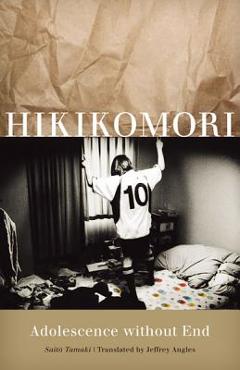Hikikomori: Adolescence Without End - Saito Tamaki

Detalii Hikikomori: Adolescence Without End -
Vânzător
libris.ro
Pret
98.95 Lei
98.95 Lei
123.69 Lei
Categorie (vânzător)
Psychology
Marca
Saito Tamaki
Descriere YEO:
Descriere magazin:
This is the first English translation of a controversial Japanese best seller that made the public aware of the social problem of hikikomori , or withdrawal--a phenomenon estimated by the author to involve as many as one million Japanese adolescents and young adults who have withdrawn from society, retreating to their rooms for months or years and severing almost all ties to the outside world. Saitō Tamaki\'s work of popular psychology provoked a national debate about the causes and extent of the condition. Since Hikikomori was published in Japan in 1998, the problem of social withdrawal has increasingly been recognized as an international one, and this translation promises to bring much-needed attention to the issue in the English-speaking world. According to the New York Times , As a hikikomori ages, the odds that he\'ll re-enter the world decline. Indeed, some experts predict that most hikikomori who are withdrawn for a year or more may never fully recover. That means that even if they emerge from their rooms, they either won\'t get a full-time job or won\'t be involved in a long-term relationship. And some will never leave home. In many cases, their parents are now approaching retirement, and once they die, the fate of the shut-ins--whose social and work skills, if they ever existed, will have atrophied--is an open question. Drawing on his own clinical experience with hikikomori patients, Saitō creates a working definition of social withdrawal and explains its development. He argues that hikikomori sufferers manifest a specific, interconnected series of symptoms that do not fit neatly with any single, easily identifiable mental condition, such as depression. Rejecting the tendency to moralize or pathologize, Saitō sensitively describes how families and caregivers can support individuals in withdrawal and help them take steps toward recovery. At the same time, his perspective sparked contention over the contributions of cultural characteristics--including family structure, the education system, and gender relations--to the problem of social withdrawal in Japan and abroad.

Hikikomori: Adolescence Without End - - Disponibil la libris.ro
Pe YEO găsești Hikikomori: Adolescence Without End - de la Saito Tamaki, în categoria Psychology.
Indiferent de nevoile tale, Hikikomori: Adolescence Without End - Saito Tamaki din categoria Psychology îți poate aduce un echilibru perfect între calitate și preț, cu avantaje practice și moderne.
Preț: 98.95 Lei
Caracteristicile produsului Hikikomori: Adolescence Without End -
Comandă Hikikomori: Adolescence Without End - Online, Simplu și Rapid
Prin intermediul platformei YEO, poți comanda Hikikomori: Adolescence Without End - de la libris.ro rapid și în siguranță. Bucură-te de o experiență de cumpărături online optimizată și descoperă cele mai bune oferte actualizate constant.
Descriere magazin:
This is the first English translation of a controversial Japanese best seller that made the public aware of the social problem of hikikomori , or withdrawal--a phenomenon estimated by the author to involve as many as one million Japanese adolescents and young adults who have withdrawn from society, retreating to their rooms for months or years and severing almost all ties to the outside world. Saitō Tamaki\'s work of popular psychology provoked a national debate about the causes and extent of the condition. Since Hikikomori was published in Japan in 1998, the problem of social withdrawal has increasingly been recognized as an international one, and this translation promises to bring much-needed attention to the issue in the English-speaking world. According to the New York Times , As a hikikomori ages, the odds that he\'ll re-enter the world decline. Indeed, some experts predict that most hikikomori who are withdrawn for a year or more may never fully recover. That means that even if they emerge from their rooms, they either won\'t get a full-time job or won\'t be involved in a long-term relationship. And some will never leave home. In many cases, their parents are now approaching retirement, and once they die, the fate of the shut-ins--whose social and work skills, if they ever existed, will have atrophied--is an open question. Drawing on his own clinical experience with hikikomori patients, Saitō creates a working definition of social withdrawal and explains its development. He argues that hikikomori sufferers manifest a specific, interconnected series of symptoms that do not fit neatly with any single, easily identifiable mental condition, such as depression. Rejecting the tendency to moralize or pathologize, Saitō sensitively describes how families and caregivers can support individuals in withdrawal and help them take steps toward recovery. At the same time, his perspective sparked contention over the contributions of cultural characteristics--including family structure, the education system, and gender relations--to the problem of social withdrawal in Japan and abroad.
